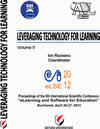E-LEARNING IN ICT AND AGRICULTURE
E-LEARNING IN ICT AND AGRICULTURE
Author(s): Lucia Cintia Colibaba, Stefan COLIBABA, Jan PawlowskySubject(s): Education
Published by: Carol I National Defence University Publishing House
Keywords: ICT; agriculture; e-learning; digital and learning resources; pedagogical and technical guidelines
Summary/Abstract: LaProf was a multilateral project that aimed at promoting language awareness to immigrating workforces in two particular sectors, ICT and agriculture. The main goal was to provide free access to online language learning resources that would help candidate immigrants get more familiarized with the terminology and cultural issues in their sectors, through developing and disseminating a number of language learning exercises. The main idea of the project was to encourage ICT teachers living in Estonia (and Baltics in general) to learn Finnish and give them assistance in an overall immigration process to Finland by increasing their knowledge about working environment and culture of the target country. Accordingly, LaProf aimed to teach Greek and cultural issues to agricultural specialists living in Romania, who want to move and work in Greece. Significant attention was given to encouraging the learning of under-representing European languages (Finnish and Greek) as foreign languages in order to help European citizens from Estonia and Romania to understand better the working environment and culture of the targeted countries (i.e. Finland and Greece). In addition, the instructions of LaProf language learning exercises are translated into widely spoken EU languages (English and French) as well as into Hungarian, Romanian, Estonian and Russian, which are notably less widely used and taught languages in Europe. LaProf developed and promoted language learning methodologies and resources that motivate the particular categories of language learners, in order to enhance their capacity for language learning. As the main output 656 interactive language learning exercises were developed for its clearly defined user groups. A series of piloting tests were applied to a specified target group, the final outputs being thus optimized to the maximum. The targeted learning resources are focused on language learning of the targeted languages, but also reflect the embedded cultural context of the destination countries and sectors.
Journal: Conference proceedings of »eLearning and Software for Education« (eLSE)
- Issue Year: 8/2012
- Issue No: 02
- Page Range: 92-99
- Page Count: 8
- Language: English

